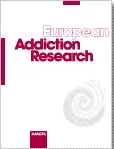 Accueil
Accueil
Détail de l'auteur
Auteur E. HOCH |
Documents disponibles écrits par cet auteur (8)
 Ajouter le résultat dans votre panier Faire une suggestion Affiner la recherche
Ajouter le résultat dans votre panier Faire une suggestion Affiner la recherche
Article : Périodique
G. QUAGLIO ; A. SCHELLEKENS ; M. BLANKERS ; E. HOCH ; T. KARAPIPERIS ; G. ESPOSITO ; H. BRAND ; D. NUTT ; F. KIEFER |BACKGROUND: Clinicians in the field of drug addiction have started to exploit the growth of Technology-Based Interventions (TBIs). However, there is little information on how health personnel evaluate them. METHODS: Semi-structured interviews w[...]
Article : Périodique
E. HOCH ; G. BÜHRINGER ; A. PIXA ; K. DITTMER ; J. HENKER ; A. SEIFERT ; H. U. WITTCHEN |Background: In a recent paper, we reported the efficacy of a modular cognitive-behavioral intervention for treating adolescents and adults with cannabis use disorders (CUD). In this study, we examine the outcome of this intervention after transl[...]
Article : Périodique
E. HOCH ; U. W. PREUSS ; M. FERRI ; R. SIMON |BACKGROUND: Existing cannabis treatment programs reach only a very limited proportion of people with cannabis-related problems. The aim of this systematic review and meta-analysis was to assess the effectiveness of digital interventions applied [...]
Article : Périodique
E. HOCH ; R. NOACK ; J. HENKER ; A. PIXA ; M. HÖFLER ; S. BEHRENDT ; G. BÜHRINGER ; H. U. WITTCHEN |AIMS: To examine the efficacy, 3- and 6-month follow-up effects of a psychological treatment for older adolescents and adults with DSM-IV cannabis use disorders. The program was tailored to the needs of this patient population. EXPERIMENTAL PRO[...]
Article : Périodique
K. MANN ; A. BATRA ; M. FAUTH-BUHLER ; E. HOCH |Evidence-based strategies for screening, diagnosing and treating alcohol use disorders (AUD) are instrumental in the early and better management of individuals at risk for or suffering from AUD. However, existing guidelines vary and may be biase[...]
Article : Périodique
E. HOCH ; D. NIEMANN ; R. VON KELLER ; M. SCHNEIDER ; C. M. FRIEMEL ; U. W. PREUSS ; A. HASAN ; O. POGARELL |We conducted a review of systematic reviews (SRs) and randomized-controlled trials (RCTs) to analyze efficacy and safety of cannabis-based medication in patients with mental disorders. Five data bases were systematically searched (2006-August 20[...]
Rapport
OEDT = EMCDDA ; J. SCHETTINO ; F. LEUSCHNER ; L. KASTEN ; P. TOSSMANN ; E. HOCH ; M. FERRI ; B. GUARITA ; R. SIMON | Lisbon : OEDT / EMCDDA | Insights, ISSN 1606-1683 | 2015This publication reviews the interventions used in the treatment of cannabis disorders and maps out the geography of cannabis treatment in Europe.
Article : Périodique
S. OLDERBAK ; J. MOCKL ; J. MANTHEY ; S. LEE ; J. REHM ; E. HOCH ; L. KRAUS |AIMS: To measure the current trends of cannabis use in Germany, measure trends in the proportion of heavy cannabis users and estimate future cannabis use rates. DESIGN: Repeated waves of the Epidemiological Survey on Substance Abuse, a cross-se[...]





